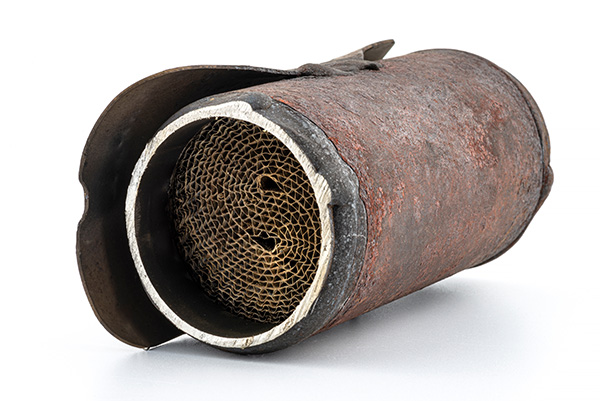
Your catalytic converter reduces harmful emissions and helps your engine run efficiently. But when it becomes clogged, your vehicle will show signs that something isn’t quite right. Left untreated, a clogged catalytic converter can lead to poor performance, increased fuel consumption, or even engine damage.
If you’re wondering whether your catalytic converter might be causing issues, here are five clear signs to watch for.
1. Poor Acceleration or Sluggish Performance
One of the most noticeable symptoms of a clogged catalytic converter is a loss of power when accelerating. If you step on the gas and your car doesn’t respond like it used to, it could be because exhaust gases are trapped in the engine, creating back pressure.
This back pressure makes it harder for your engine to push exhaust out and pull fresh air in, choking performance. Drivers often describe the sensation as the car feeling bogged down or slower to respond, especially during uphill driving or highway merging.
2. Reduced Fuel Efficiency
When your engine is struggling to breathe properly, it has to work harder to deliver the same performance. That means it burns more fuel to keep up with demand.
If you’ve noticed you’re filling up more often than usual, or your fuel economy has dropped suddenly, a clogged catalytic converter might be the reason. While other issues like dirty fuel injectors or worn spark plugs can also hurt fuel efficiency, a failing catalytic converter is a common culprit.
3. Rotten Egg Smell From the Exhaust
Your catalytic converter is supposed to convert hydrogen sulfide from exhaust gases into harmless sulfur dioxide. But when the converter isn’t functioning correctly, it may release a distinct smell that resembles rotten eggs.
This odor is usually strongest near the tailpipe and may become more noticeable during or after a drive. If you pick up on this smell, it's best to have your exhaust system inspected immediately. It’s not just unpleasant — it’s a sign of incomplete combustion and emissions problems.
4. Check Engine Light Is On
A clogged or failing catalytic converter will often trigger your vehicle’s onboard diagnostics system. The check engine light might come on due to a drop in exhaust flow, changes in oxygen sensor readings, or increased emissions.
Even if your car still feels like it's running normally, a lit check engine light is a clear sign something needs attention. A technician can scan the system for error codes and determine whether the converter or another component is to blame.
5. Rattling Sounds From Under the Vehicle
Over time, the internal components of a catalytic converter can break apart, especially if the converter has overheated or been exposed to unburned fuel. When this happens, you may hear a rattling noise coming from underneath the vehicle, especially when starting the engine or accelerating.
This noise comes from loose ceramic pieces or damaged metal components inside the converter. While it might sound minor, it typically means the converter has failed and will need to be replaced.
Don’t Delay Repairs
A clogged catalytic converter can lead to more than just annoying symptoms. It can increase engine temperatures, strain other exhaust components, and contribute to long-term damage. In some cases, a completely blocked converter can prevent the engine from starting at all.
If you suspect an issue with your converter, the best move is to schedule a diagnostic inspection. A technician can measure exhaust pressure and flow to confirm whether the converter is the source of the problem.
Catalytic Converter Inspections in Virginia Beach, VA at European Autowerks
At European Autowerks in Virginia Beach, VA, our technicians specialize in emissions and exhaust system repairs for a wide range of European vehicles. If you’re experiencing performance issues, fuel economy changes, or unusual exhaust smells, we’ll help determine if your catalytic converter is to blame.
Book your inspection today and keep your car running clean, efficient, and reliable.